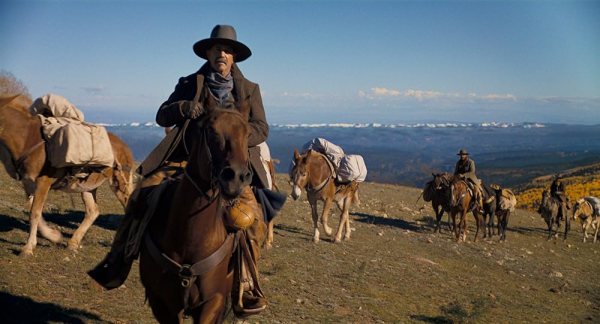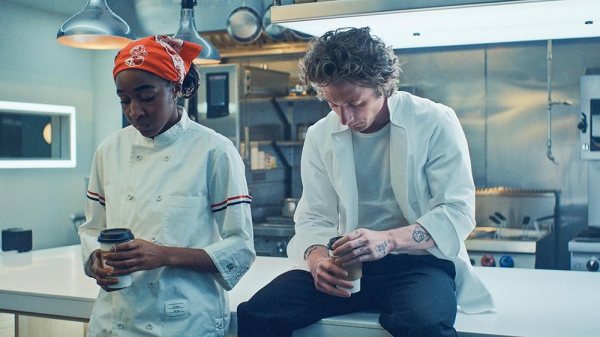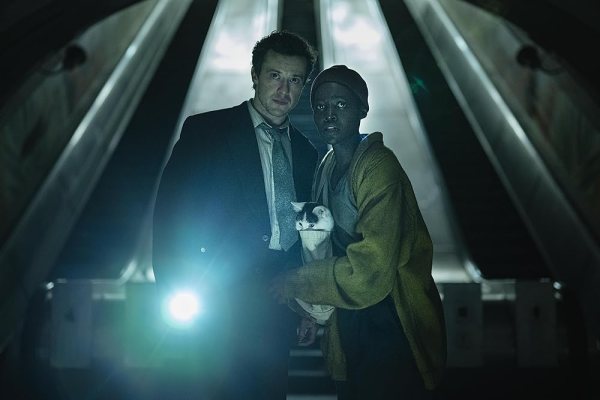“You don’t tell a boy that’s been left behind at Christmas that you’re aching to cut him loose. That nobody wants him.”
That’s what Mary (Da’Vine Joy Randolph), a cafeteria manager at the fictional Barton Academy and the grieving mother of a recently killed son, declares in Alexander Payne’s excellent new film, The Holdovers. She does so at the end of a squabble between two centerpieces of the all-boys prep school subgenre: the irritable teacher and the troublesome student.
The teacher, the longtime—and long-hated—ancient civilization lecturer Mr. Paul Hunham (Paul Giamatti), had moments earlier taken a jab at one of the titular holdovers under his tutelage during winter break. “Do you think I want to be babysitting you?” he characteristically snarls. “I was praying to the god I don’t even believe in that your mother would pick up the phone or your father would arrive in a helicopter or a flying saucer.”
The student, Angus Tully (Dominic Sessa), certainly defies authority with ease. The tendency got him kicked out of three other high schools, and he’s on the cusp of being transferred to a military academy. Angus expected to spend Christmas in Saint Kitts, only to receive a last-minute call from his mother asking (though, really, telling) him to remain at Barton over break. She and her new husband Stanley, she says, have not had time for a honeymoon—now is their time.
There’s much to enjoy and admire about The Holdovers, from its performances, to its retro feel (the film takes place in December 1970 and its cinematography tries to emulate the look of movies at the time), to the way its screenplay seamlessly blends hilarity and heartache. But among its cultural insights, the film makes two important points about privilege—one conventional but timely, and one frequently underexplored.
From Dead Poets Society to Scent of a Woman, prep schools in film have served as symbols of either the rigidity or the hypocrisy of the upper, upper class. Their stern rules and codes of honor ring hollow when they’re circumvented for the student whose namesake appears on the library entrance or whose relatives funded a new gym. That’s the first important point The Holdovers makes: that the preservation of status can often preclude the inculcation of virtue.
Hunham—who himself was a Barton student—laments this state of affairs early in the film, when he proudly stands by his decision to fail the son of a sitting U.S. senator (and major Barton donor), much to his principal’s chagrin. “We cannot compromise our integrity at the altar of their entitlement,” Hunham asserts. Yes, we’ve heard similar stories before, but they’re important to remember as we debate the role of, say, legacy admissions.
But The Holdovers also makes a surprising choice for our times, when the left indulges eat-the-rich fantasies and the right revels in elite-bashing. The film explores how privilege can nevertheless fail to fend off the pain of loneliness.
A common response to the Anguses of the world might be to play the world’s smallest violin for their admittedly #firstworldproblems. After all, how much sympathy can there be for an inconvenienced elite who has to miss a Caribbean getaway en route to a career-catapulting stint in the Ivy League?
“They’ve had it easy their whole lives,” Hunham says. But Mary, of all people, isn’t so sure. “You don’t know that,” she replies. “Did you?”
Out of all the film’s characters, Mary’s the one who arguably has the most reason to dismiss whatever suffering Barton’s privileged students face. Her deceased son Curtis actually attended the prep school on a scholarship. He had his “eyes set on Swarthmore,” Mary recounts, but without the means to foot the bill he ended up drafted to Vietnam—a fate his classmates would never face. It’s easy to imagine Mary, privy to displays of entitlement at Barton and one of the few black people at the school, being bitter.
True, she sometimes doesn’t hold back criticism. “Rich and dumb—a popular combination around here,” she remarks of one particularly insufferable pupil. But Mary also refuses to treat Angus as a mere stand-in for his social class.
Through Mary, the movie points out something we forget in our discussions about privilege: Although it’s real, the divisions it creates are not insurmountable. There’s something unifying about loneliness and loss in the film—and, I’d argue, in our lives—that cuts through the various forms of privilege that our discourse so often focuses on, whether about class or race. Mary notices far sooner than Hunham that Angus feels rejected. By the time a pivotal scene arrives at the end of the movie, it’s not surprising that she extends her hand in comfort. There’s some distance, sure, but not enough to keep her—the presumably “less privileged” one—from sympathizing with his fears.
However aware Mary is about the entitlement of the Barton students, she doesn’t see Angus as an avatar for “the rich” or “white people.” She sees a boy that’s been left behind at Christmas.
Randolph’s performance deserves special recognition for making this idea apparent. In a lesser film and with a less talented actress, Mary could have been reduced to predictable tropes of the sassy minority sidekick. But The Holdovers rightly gives her a character arc of her own, dealing with the pain of Curtis’ death while not letting it consume her.
The Holdovers works as a comedy. It works as a coming-of-age story. And it works as an exploration of privilege, one that recognizes its pitfalls while also refusing to let it become the main criteria through which we judge a person.









Please note that we at The Dispatch hold ourselves, our work, and our commenters to a higher standard than other places on the internet. We welcome comments that foster genuine debate or discussion—including comments critical of us or our work—but responses that include ad hominem attacks on fellow Dispatch members or are intended to stoke fear and anger may be moderated.